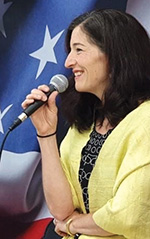Can Happiness Make Us Better Diplomats?
The State Department has begun to recognize the need to improve the workplace environment. Here are some insights on the role happiness might play.
BY AMELIA SHAW
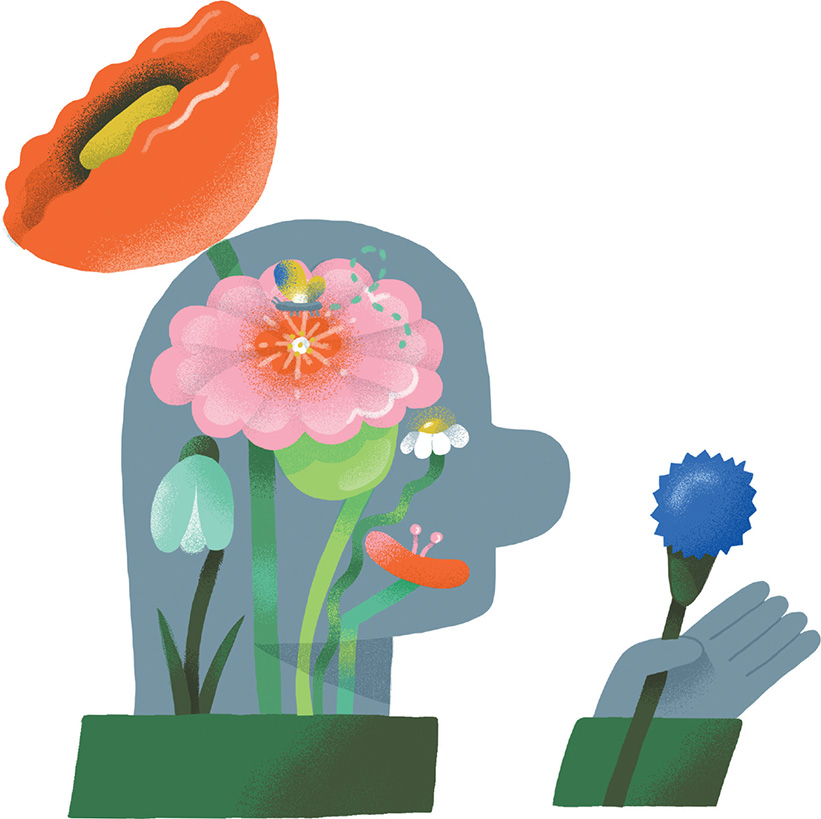
Beth Walrond
Is it ever too late to find happiness? Bestselling author and Harvard Business school lecturer Arthur Brooks doesn’t think so, as he says in his latest book, Build the Life You Want: The Art and Science of Getting Happier, co-authored with Oprah Winfrey.
Brooks often coaches business leaders on how to use happiness to increase productivity and reduce corporate burnout. “We are all entrepreneurs. We are all CEOs of our own lives,” he says. “And happiness is the business of life.”
When it comes to the State Department, Brooks thinks happiness may contribute to stronger diplomacy. In February, he was at the department, as part of the Secretary’s Open Forum, to talk to diplomats in Washington and around the world about how creating happiness in our lives will lead to stronger leadership in the workplace—potentially increasing our diplomatic effectiveness. He got a warm reception from the nearly 200 State employees attending in-person and another 1,000 online.
Brooks presented a sobering view of today’s workplace. “We are seeing declines in happiness around the world, and for diplomats it has been particularly acute,” he said, citing causes such as the complexity of world events and a lack of appreciation for diplomatic engagements.
The State Department’s 2022 Federal Employee Viewpoint Survey found declining confidence, satisfaction, and engagement among department employees, prompting the Bureau of Global Talent Management and leadership to take note.
“We need to figure out how to be happier as an institution,” said Director of the Foreign Service Institute Ambassador Joan Polaschik in introducing Brooks at the event. “If we want to maintain our leadership status in the world—which we do in part by maintaining our competitive advantage as an employer—then we need to address this.”
It’s More Than a Feeling
Brooks promotes a simple but novel idea. “Contrary to popular belief,” he said, “happiness is not a feeling but a skill—one that if we practice, we can get better at.” To hear Brooks tell it, creating happiness in your life is sort of like eating a balanced diet. “Think of it like food,” said Brooks, “which is basically just protein, carbs, and fats. You need to balance these macronutrients to get proper nutrition. The same is true for happiness.” His research suggests that the “macronutrients” for creating happiness are enjoyment, satisfaction, and meaning—all of which are things in our lives that we can control.
This means that happiness does not come down to genes or luck, nor does it depend on outside stimuli. Just like nutrition, finding the right balance for happiness takes intention, planning, and work to create healthy habits. But what does this mean?
Choose Enjoyment over Pleasure
Take enjoyment. Many people think enjoyment means just doing whatever you feel like doing—essentially chasing pleasurable experiences. The problem is that pleasure on its own is incomplete and can lead to addictive behaviors. You can’t create true enjoyment if all you are doing is seeking pleasure. The trick, said Brooks, is to add people and memory.
Just look at how big companies market their products. “You’ll notice that beer companies don’t make commercials featuring some dude alone in his apartment pounding a six-pack,” said Brooks. Instead, he said, they might show a guy in a living room watching football with his brother and his friends, jumping with joy as their team scores a touchdown.
“That’s enjoyment,” said Brooks: pleasure, plus people coming together to make a memory. “And you need enjoyment in your life, you need enjoyment in your work.”
I Can’t Get No … Satisfaction
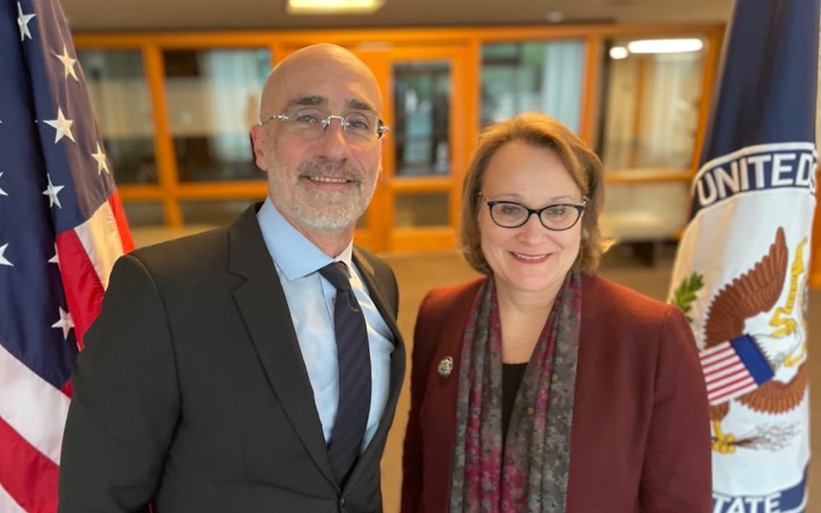
Arthur Brooks and Director of the Foreign Service Institute Ambassador Joan Polaschik at the State Department on Feb. 23, 2024.
Amelia Shaw
When the Rolling Stones released their 1965 hit “(I Can’t Get No) Satisfaction,” the song’s iconic guitar riff and saucy lyrics became a near-instant global sensation. “But you know, I think Mick Jagger got it wrong,” said Brooks. “You can get satisfaction. You just can’t keep it.” Put simply, satisfaction is the joy you get from struggling to achieve. You suffer through something for the promise of the reward. But once you get that reward, the satisfaction doesn’t last.
In neuroscience terms, this is Mother Nature creating a “hedonic struggle”: As a person makes more money or climbs the career ladder, their expectations and desires also rise. According to Brooks, this evolutionary mechanism prevents humans from simply giving up in life. Mother Nature wants us to keep climbing higher.
The problem is it also creates a “satisfaction dilemma,” particularly among overachievers (which describes a sizable percentage of State Department personnel). The more our career treadmill speeds up, said Brooks, the more we want to go faster to reach the next milestone. But the satisfaction we get is fleeting, so we are never actually happier in the process.
This is a problem. To find a way to tackle it, Brooks traveled to a small town high in the Himalayas to ask an expert. “Every year as part of my work with Harvard, I go see the Dalai Lama. So I went to Dharamsala, and I asked him what’s the secret to lasting satisfaction.” The answer had a lot to do with downsizing our desires and expectations.
“He said,” Brooks recounted, “that you need to want what you have, as opposed to having what you want. You need to manage your wants.” In other words, less is more, and gratitude is everything.
What Does “Meaning” Even Mean?
The third piece of the puzzle is meaning, the most complex piece. But it is one that can be boiled down into two basic questions, says Brooks: Why am I alive? For what would I be willing to give up my life right on this day?
“These are not easy questions,” said Brooks. But answering them is critical to giving us humans a higher sense of purpose, one that revolves around an idea that most department employees are quite familiar with: the call to service. In fact, Brooks speculated that most of us in diplomacy are not short of a sense of purpose in our work. We understand our value as public servants committed to making the world a better, safer place.
The problem is that many employees let ambition and overexertion eclipse other parts of their lives, with miserable results. “When you are highly accomplished, it is very easy to become your job. But you are not,” said Brooks. “Probably most of you here were high achievers as kids. And now your burden is that you overindex your career, and you become success addicts.”
Turning that problem around is not so easy because, as Brooks pointed out, when you give overworked diplomats the chance to work less, they often … don’t: “They don’t know how to not work.” This is a path that leads to burnout and may help, in part, explain the department’s low FEVS survey results showing decreasing job satisfaction among diplomats. “In the end,” said Brooks, “the only thing that really matters for your work and your success is serving other people. Earning your success, a sense of accomplishment and value for your life—all of this comes from serving others.”
Making a Habit Out of Happiness
Brooks had succinct and actionable advice for diplomats. “You have to be open about your success addiction and be willing to bring others in to help you, so that you can give yourself a more balanced life.” And, in addition to your work, you also have to focus your daily habits around a few other key elements to bring you lasting joy—namely, family, friends, and faith—with some caveats.
Family. You don’t choose them, and you may not always like them. But they are part of you and you of them, and it matters.
Brooks’ research suggests that the “macronutrients” for creating happiness are enjoyment, satisfaction, and meaning—all of which are things in our lives that we can control.
Friends. Invest time in your real friends, and not the “deal friends” you make in the halls of the department to get you your next promotion. Remember that real friends are “useless” in the sense that they have no transactional value. But they love you, no matter what.
While this may sound simple, Brooks acknowledged that maintaining real friendships is actually pretty challenging given the FS pick-up-and-go lifestyle. “A lot of people who travel around in the Foreign Service,” said Brooks, who has moved around a lot himself, “make a mistake if they are not establishing relationships that transcend moving and work.”
Investing the time to forge deeper relationships that last throughout the years will directly improve happiness. “Every time you move, pretend you’ve been there for 10-15 years. Open the Bible study, start the book club,” he said. “Within two weeks, as soon as your house is stocked with pots and pans and furniture, invite people over for dinner. Don’t wait for people to invite you.”
Faith. Faith isn’t only about religion or God. Faith is the thing that pulls you out of your life and helps you transcend it, even for a moment. Maybe it’s a walk in a forest. Maybe it’s a Bach fugue. Maybe it’s sitting 10 minutes quietly with your eyes closed without your phone. Or maybe it’s church.
Whatever your faith is, you need to devote a little bit of time to it regularly, to help you transcend the antics of your day-to-day and get some peaceful perspective. “Take time to work on your interior life,” said Brooks. Otherwise our busyness can distract us from our true purpose—service to others.
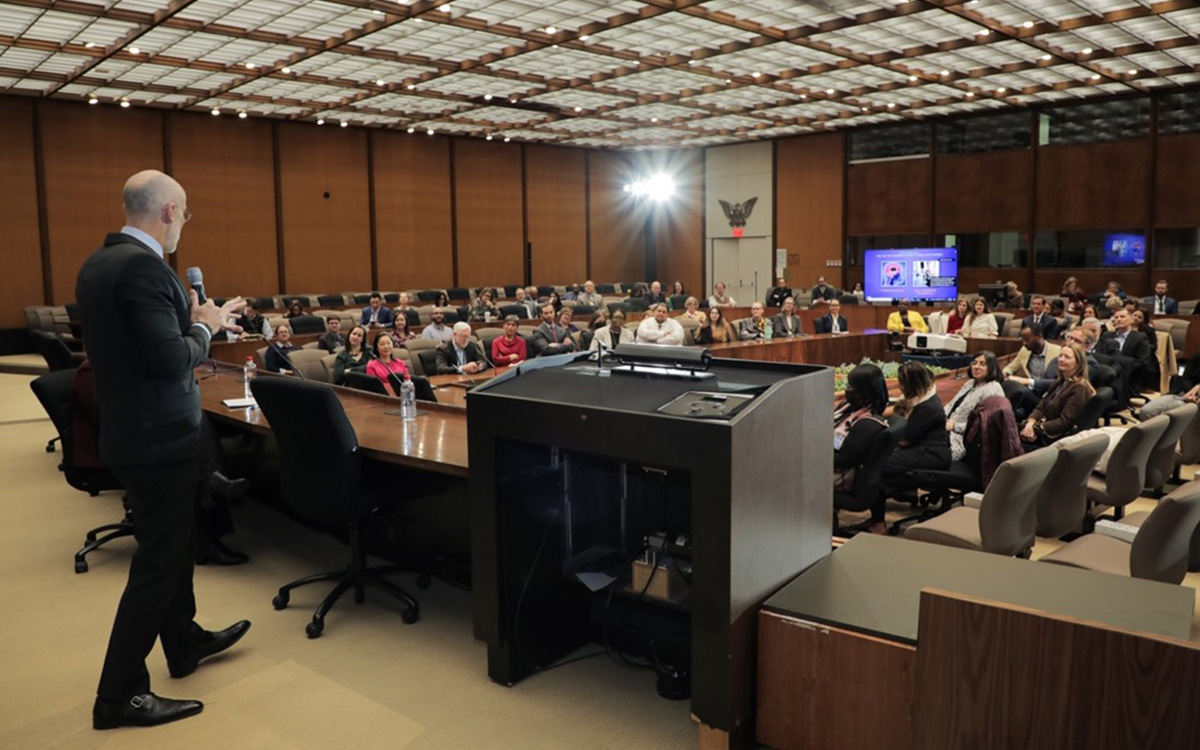
Arthur Brooks speaks at the State Department on Feb. 23, 2024.
Michael Smith
Why It Matters
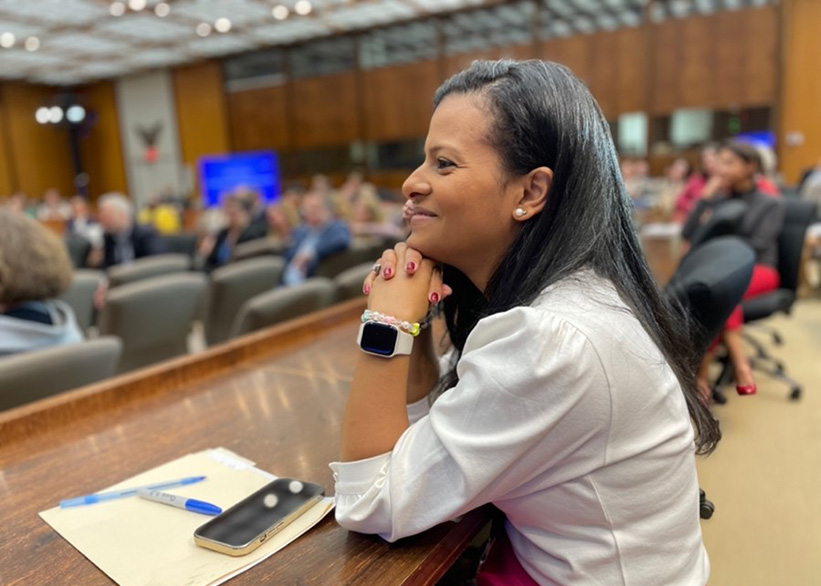
FSO and event co-organizer Johanna Villalobos at the talk. Villalobos first met Brooks during her participation in the Secretary's Leadership Seminar, a joint program of FSI and the Harvard Business School.
Amelia Shaw
For many government employees attending, Brooks’ talk resonated. For Melanie McIntyre-Pote, the discussion of work addiction rang true, and she was grateful for the practical advice Brooks gave. “There are so many things in life we can’t control, like traffic,” she said. “But I understand now that I need to focus on the things I can change, like my own daily habits.”
Adam Meier from the Bureau of Educational and Cultural Affairs found the discussion of neuroscience insightful and is thinking about how to incorporate teaching happiness into his team’s work on academic exchange programs.
Peter Redmond, director of FSI’s Center of Excellence in Foreign Affairs Resilience, came away inspired to explore more ways to tap into the science to promote greater meaning and happiness in State Department work from the top down. “There are natural corollaries between this research and our work at the department—particularly for our leadership. Now we need a broader embrace,” said Redmond.
There is growing interest in how happiness contributes to strong leadership, as FSO Johanna Villalobos laid out in her April 2024 Foreign Service Journal Speaking Out article, “The Surprising Secret to Powerful Leadership.” As research increasingly shows, happy people are more productive and innovative. They inspire others and, by doing so, have the potential to create real and lasting change. Villalobos, who recently completed a yearlong Cox Fellowship examining happiness and leadership, helped organize the Brooks event.
In fact, since 2021, State Department leadership has been increasingly willing to acknowledge the need for a better workplace environment. When presenting the modernization agenda, Secretary Blinken said, “We have a window before us to make historic, lasting change, and we’re determined to seize it.” Making good on this commitment, FSI’s Leadership and Management School invited Brooks to lead a session at the June Chiefs of Mission Conference, focusing on how senior leaders can use their unique positions to create a healthier organizational culture and improve workforce well-being.
Arthur Brooks’ parting words echoed this sentiment: Once we learn to balance happiness in our own lives, we should seize the opportunity to teach these skills and habits to others. “As a leader, you can create an ecosystem that makes it easier for people to pursue these skills,” said Brooks. “So, if you want to change the culture of your organization, then go out and be happiness teachers.”
And, he added, if we as diplomats succeed in this, the world will undoubtedly be a better place.
When sharing or linking to FSJ articles online, which we welcome and encourage, please be sure to cite the magazine (The Foreign Service Journal) and the month and year of publication. Please check the permissions page for further details.
Read More...
- “On Launching a Rewarding Career” by Angie Bryan, The Foreign Service Journal, June 2017
- “Enhancing Resilience” by Beth Payne, The Foreign Service Journal, March 2019
- “The Surprising Secret to Powerful Leadership” by Johanna Villalobos, The Foreign Service Journal, April 2024

